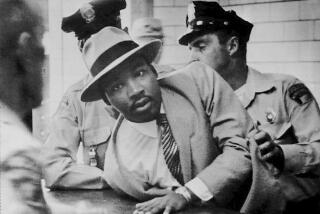An Excellent Overview of B. B. King
- Share via
B.B. King may be at once the -most famous and most taken-for-granted bluesman in pop history.
One reason for both titles is familiarity.
Where some classic blues figures (starting with Robert Johnson) died before the start of the rock era, and others (including Muddy Waters and Howlin’ Wolf) enjoyed only limited mainstream success, King has registered almost three dozen singles on the weekly Top 100 pop charts and has toured so extensively that he always seems to be either in town or on the way. King, 67, has also benefited from lots of TV exposure.
Another reason for both the popularity and the fact that he is sometimes less prized by critics than the Johnsons and Wolfs is that his musical style isn’t as raw--or pure--as many of his blues rivals’.
Yet King’s influence on blues and rock artists has been immense, and MCA’s new “King of the Blues” offers an excellent overview. A set worthy of yet another Grammy for MCA reissue head Andy McKaie, the four-disc package contains 77 songs, including 30 that have never appeared before on CD and seven that have never been released in any format.
The selections range from such ‘50s R&B; hits as “Three O’Clock Blues” to 1970’s “The Thrill Is Gone” and 1989’s U2-assisted “When Love Comes to Town.”
A Mississippi native, Riley B. King was a disc jockey in Memphis, where he picked up the nickname Blues Boy (later shortened to B. B.) and began his recording career in the late ‘40s.
From the beginning, King reached out to other musical fields, including jazz and pop, rather than stick to music that is, in the words of rock historian Peter Guralnick, the “product of a local or isolated tradition.”
In an essay in the set’s booklet, Colin Escott explores King’s broad approach: “(His) achievement has been to take the primordial music he heard as a kid, mix and match it with a bewildering variety of other musics and bring it all into the digital age without making it sound as though it has been preserved in formaldehyde.”
In an interview for the set, King expands on the point. “The first rock ‘n’ roll I ever knew about was Fats Domino and Little Richard because they were playing blues but differently. And I started to do what I do now--incorporating. If you listen to the records (of the time), you’ll hear a little bit of difference. . . . I’ve always felt that there’s nothing wrong with listening and trying to learn more. You can’t just stay in the same groove all the time. Somebody once said you can’t teach an old dog new tricks, but I always believed you can teach him new ways to do the old ones.”
More to Read
The biggest entertainment stories
Get our big stories about Hollywood, film, television, music, arts, culture and more right in your inbox as soon as they publish.
You may occasionally receive promotional content from the Los Angeles Times.










